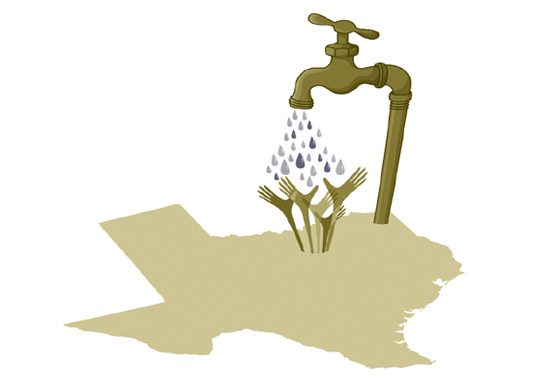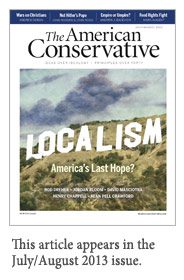Texas Water War

The Sulphur River rises in northeast Texas and flows eastward through some of the last and best hardwood bottomland in the state. Culturally and ecologically, this region is the South, a country of turbid waters flowing beneath white oak, bur oak, Shumard oak, and ash. Here a few cowmen still work in the Cracker manner, with the help of rough “cur-dogs” that might pull night shifts baying feral hogs.
Scattered about the region are small communities—Cuthand, Naples, Omaha, Dalby Springs. All support, and are supported by, farming, logging, and the broader timber industry. Hunting and fishing are deeply embedded in the culture. Recreational hunters from urban areas pay landowners for access to forest and field and patronize local businesses.
The first Anglo settlers trickled into the region in 1820s and began displacing the Kickapoo, who had settled there after the contagion-induced collapse of the Caddo. Area farmers eked out a living growing cotton, peanuts, and corn. Half-wild cattle and swine foraged on open range. By the early 1940s, descendants of those who first plowed former Caddo land found themselves displaced when urban land buyers began to put up fences to keep out free-range livestock. Many smalltime stockmen left; others resorted to sharecropping. Fence cutting was common.
Some held on, however. Their heirs still draw all or part of their livelihoods from the land. But a new threat looms. While sixth-generation Sulphur River farmers look at their grandkids and see eighth-generation landowners, 120 miles west, on the semi-arid Blackland Prairie, Dallas-area business interests and water developers see in the verdant Sulphur watershed the essence of unlimited urban and suburban prosperity.
They want Sulphur River water “to ensure continued economic growth” and claim that their region’s economic contribution to the state gives them a right to it. If they prevail, 67,000 acres of prime hardwood bottomland—all privately owned—will be condemned, taken under eminent domain, and drowned beneath a reservoir that will supply water to a growing Dallas-Fort Worth metroplex. Then, to satisfy environmental requirements, additional land—as much as 140,000 acres—will be condemned and set aside to mitigate the loss of high-quality wildlife habitat.
The taking of private property has a way of provoking unlikely alliances—whether small farmers and anarchists fighting construction of the planned Aeroport du Grand Ouest in France, elderly urban preservationists and youthful hipsters beating back philistine incursion from chain stores in America’s urban cores, or in this case, Northeast Texas farmers, environmentalists, hunters, loggers, timber companies, and local real estate agents fighting to protect their independence from outside power.
Traditionalist conservatives concerned about community and continuity and libertarians offended by threats to private property share common enemies here, though these neighbors on the political right fight on different fronts. Libertarian economist Murray Rothbard dipped an anarchic toe into the roiling Texas waters in a 1993 article, “Environmentalists Clobber Texas.” Rothbard blamed environmentalists and the Endangered Species Act, calling them egregious obstacles to private and municipal use of water and suggesting that the Sierra Club preserve endangered “critters of various shapes and sizes” in zoos. More seriously, he suggested,
A longer-run solution [to water-use conflicts], of course, is to privatize the entire system of water and water rights in this country … . If all resources are privatized, they will be allocated to the most important uses by means of a free price system, as the bidders able to satisfy the consumer demands in the most efficient ways are able to outcompete less able bidders for these resources.
He has a point. Water development is heavily subsidized, and Dallas-area residents and businesses are among the most profligate water users in the state, in part because they aren’t paying anywhere near true market value. Surface water is treated as a public resource—despite, in some cases, byzantine systems of junior and senior water rights—and the citizens of northeast Texas can’t claim Sulphur River water as their own. By extension, since flowing water must be impounded for use by large municipalities, landowners in the Sulphur watershed now stand to lose property that has been in their families since before the fall of the Alamo.
The proposed impoundment, named Marvin Nichols Reservoir in honor of one of the founders of Freese & Nichols, Inc., a Fort Worth engineering firm, will cost an estimated $3.3 billion. A 2002 study by the Texas State Forest Service estimated that construction of Marvin Nichols Reservoir would cost the northeast Texas economy 400-1,300 jobs and $87-$275 million annually.
But like old Jeremy Bentham tallying “hedons” and “dolors” to calculate the greatest good for the greatest number, urban business interests, water developers, and politicians make a utilitarian case for eminent domain. Their accounting involves population growth, economic growth, and especially, of course, jobs. They assure us that while they feel for rural landowners, we must face reality and look to the future. The landowners will be fairly compensated.
In 2007, I attended a meeting of the state Senate Committee on Natural Resources. At issue was a bill that would “designate” 19 future reservoir sites, including sites on the Sulphur River. A dozen or so citizens expressed their opposition or support. A Fort Worth attorney explained with reptilian equanimity that all opposition was futile, and in a moment of poorly hidden exasperation, a pro-reservoir senator said, “Like it or not, these millions of people are coming. It’s our responsibility to make sure the needed water is there.”
In a bitter legislative battle that year, urban interests—to the accompaniment of constant tub-thumping by editorialists at the Dallas Morning News—prevailed. Many northeast Texas landowners now walk pastures and woodlands that have been designated as possible reservoir sites. Although the properties have not yet been formally condemned, they cannot be used in any way that could interfere with future reservoir construction. If a farmer decides to cut his losses and sell, what kind of price can he expect under this restriction on the property?
Whether or not new reservoirs are required to meet projected population growth and the economic goals of the Dallas-Fort Worth elite is a matter of fierce debate. Landowners and environmentalists argue that needs can be readily met with existing reservoirs and through increased conservation and improved technology. In his indispensable muckraking blog at The Texas Observer, Forrest Wilder summed up the view of most reservoir skeptics: “There’s big money in building reservoirs, but not so much in fixing leaky pipes… I mean, who’s lobbying for a sensible plumbing code?”
As it happens, the engineering analysis that forms the basis of Dallas region’s water plan was performed by Freese and Nichols—the Fort Worth firm likely to receive the lion’s share of the reservoir-engineering contract.
Is this cronyism a Texas thing, or is it representative of powerful bodies everywhere that push for giant engineering projects that require eminent domain? Must such projects go forward because “these people are coming” or so that “these people will come”? And how will the projected benefits be distributed—put another way, how will the natural wealth be redistributed?
At first blush, this kind of disruption seems a perfect example of what economist Joseph Schumpeter called capitalism’s “perennial gale of creative destruction.” Yet what’s creative about the destruction of land and livelihoods in the Sulphur River basin; what advances have made stock farming and logging in that region obsolete? Is this not simply a transfer of vast human and natural capital from one region to another?
In “Prospects for the Proletariat,” Russell Kirk described the destruction wrought by urban renewal on venerable working class neighborhoods in Detroit.
What resulted were urban deserts and urban jungles, not renewal; great profits, though, were made by eminent developers and contractors … The newcomers to Detroit had only begun to settle into tolerable community … when down the streets came the federal bulldozer. Where to flee now?
Land grabs like the proposed Sulphur River projects—or like China’s Three Gorges Dam, which sent millions of peasants streaming into the cities—represent proletarianization on an egregious scale.
At a bar in Omaha, Texas, I met a self-employed logger who’d spent his working life in the Sulphur River basin. A huge, bearded man right out of central casting, he bred and trained mules for pulling logs from places where industrial skidders would be too destructive. “That reservoir will probably put me out of business,” he said.
What does a middle-aged logger do after the source of his livelihood is inundated or put off-limits? “Where to flee now?” To the city, perhaps, where he can compete amid the burgeoning workforce that justifies the reservoir that prevents him from earning a living in his home region. No doubt the economy will boom.
Besides the obvious disruptions, a growth-at-all-costs ideology that treats land, water, and communities as nothing but raw material inflicts insidious damage to the foundations of constitutionalism. In Ideas Have Consequences, conservative thinker Richard Weaver argued that the right of private property is “the last metaphysical right remaining to us,” the only one to survive the “rancorous, leveling winds of utilitarianism.” Drawing on Locke and Jefferson, Weaver called widely distributed ownership of small property the most effective barrier against an encroaching state and predatory capitalism. “Respecters of private property are really obligated to oppose much that is done today in the name of private enterprise,” he wrote.
 Similarly, in How to Think Seriously About the Planet, philosopher Roger Scruton argues that love and community arise from a sense of permanence. But if no place is safe from plunder, then no place can be safely loved. Over time, nihilism will pervade.
Similarly, in How to Think Seriously About the Planet, philosopher Roger Scruton argues that love and community arise from a sense of permanence. But if no place is safe from plunder, then no place can be safely loved. Over time, nihilism will pervade.
Gary and Dolores Cheatwood have spent their lives in the community of Cuthand, in Red River County. They own 600 acres, nearly all of it timber of the highest grade. Gary was born there. His grandfather bought the first 100 acres around 1917. The Cheatwoods graze a few cattle on the property; they hope to leave the timber for their two children and five grandchildren to use judiciously. No one will draw a living entirely from that 600 acres, but it provides the family a degree of independence. It’s there if they need it. Marvin Nichols Reservoir would cover their property.
“It’s tough,” Gary says. “Our grandkids love the land. We haven’t cut any timber on it in our lifetime. There are state and national champion trees there. My grandparents and great-grandparents lived there. We’ve been in this fight for about 10 years, and I expect my son and grandkids will take up the fight too.”
Andrew Sansom, Executive Director of the Meadows Institute for Water and the Environment at Texas State University-San Marcos, writes in In Water for Texas: An Introduction, “We must find a way to move water westward in Texas. This is inevitable, but, again, the prospect of interbasin transfer is one that is not universally accepted.” Inevitable, perhaps—and even democratic, given that residents of Dallas Fort-Worth far outnumber those of the Sulphur River basin. But that doesn’t make it right.
Conservatives and libertarians tend to be sanguine about population growth, and I’m confident that humans can engineer around shortages for generations to come. But I doubt that the politicians or the giants of global capitalism who tout the benefits of an infinite labor pool possess either the imagination or empathy to keep a debit column of human expense. Perhaps if these visionaries stood in a river bottom, amid giant hardwood trees, and listened to a rural Texan say that she prays for an endangered species to appear on her property…
Henry Chappell is a novelist and journalist in Parker, Texas.
Comments